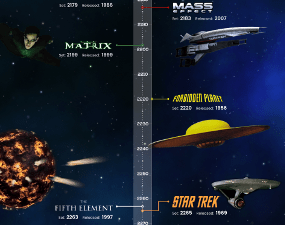 I loved the original Twilight Zone and The Outer Limits, but I was horrified when they were replaced by Lost in Space, a kiddie show I took as a personal insult (being a young teenager I took EVERYTHING as a personal insult).
I loved the original Twilight Zone and The Outer Limits, but I was horrified when they were replaced by Lost in Space, a kiddie show I took as a personal insult (being a young teenager I took EVERYTHING as a personal insult).
Fortunately Star Trek came along, an ‘adult’ series that took science fiction seriously. Even better, it expressed the 1960s modernity craze with eye-catching details like beehive hairdos, sky-high hemlines, and a bridge layout so advanced the US Navy sent ship designers to study the set. Today people forget how innovative all this seemed when the show first aired. It had quite an impact. No less an authority than Isaac Asimov called Star Trek “the first good television science fiction.” As a science fiction fan I felt both thrilled and vindicated.
I was never a Trekkie. But I was grateful. Star Trek salvaged my faith in SF.
Of course my favorite character was Science Officer Spock. His calm, logical approach to absolutely everything, be it needling Kirk or confronting the latest alien menace, struck me as utterly fascinating. I wanted to BE Mr. Spock.
How did Spock strike the critics on first exposure? They didn’t know what to make of him.
TV critic Joyce Dingman wrote:
The only really appealing character on Star Trek is Leonard Nimoy as the slant-browed Spock, a creature from a planet where they’ve done away with emotion. “Where there is no emotion, there is no violence,” Spock explains, in the tones of a calm, loyal, helpful dog. I guess on his planet, having done away with adrenal glands, they’ve also done away with both public and private affairs. What do you suppose THEY have for television programs?”
Hmmm, good point. I don’t think the show ever revealed the nature of Vulcan media.
UPI focused on Spock’s ears as the source of his appeal:
Leonard Nimoy is the Vulcan with pointed ears in television’s Star Trek with whom half the female population has fallen in love. Is it his ears that throttle up feminine hearts? …If it is the sharpened ears that bring in 5,000 letters a week from aggressive dames, plastic surgeons may find long lines of hopeful males pounding on their doors for surgery.”
 Possibly a tad exaggerated. Correcting the shape of my ears in order to attract girls never occurred to me. Sadly, I settled for wearing Stanfield brand turtlenecks for that sexy ‘come hither’ Trekman look. Wasn’t all that effective. Nobody wanted to beam me up, let alone fondle the points of my ears.
Possibly a tad exaggerated. Correcting the shape of my ears in order to attract girls never occurred to me. Sadly, I settled for wearing Stanfield brand turtlenecks for that sexy ‘come hither’ Trekman look. Wasn’t all that effective. Nobody wanted to beam me up, let alone fondle the points of my ears.
In truth, I suspect the real reason I identified with Spock is related to the result of a network survey conducted to discover the reason for his popularity:
“He is rejected and doesn’t dig Earth-type girls.”
Evidently women considered this an enticing challenge and were attracted to him in determined droves. Subconsciously I emulated him, feigning indifference (extreme shyness helped), but with zero effect. Maybe I should have adopted the ear style after all.
Gene Roddenberry had his own explanation:
“We’re all imprisoned within ourselves. We’re ALL aliens on this strange planet. So people find identification with Spock.”
True enough as far as it goes, but Spock’s popularity appeared to be fueled by more than mere angst and self-doubt on the part of viewers, it seemed to be based on something as all-consuming as a massive black hole.
Leave it to Isaac Asimov to discover the truth. He asked his twelve year old daughter:
“Mr. Spock is dreamy,” she said.
For Asimov this was a paradigm shift, an epiphany, an overwhelming revelation:
“It hadn’t occurred to me that Mr. Spock was sexy. I had never realized that such a thing was possible; that girls palpitate over the way one eyebrow goes up a fraction; that they squeal with passion when a little smile quirks his lips. And all because he’s SMART. It’s SEXY to be smart!”
No wonder no one mistook me for an interplanetary Casanova. I was never able to memorize the times tables. I can’t quote the periodic table. I can’t even MAKE a table. Sigh.
Nimoy himself stated:
“The kids dig the fact that Mr. Spock is cool.”
Yes, Spock was most definitely cool. His persona rather resembled that of a Beatnik, and everybody knew that Beatniks were intellectually cool (as opposed to the up-and-coming Hippies who were emotionally cool). “I grok Spock?” No. More like, “I dig Spock.”
 The show aired in September 1966. Not long after, in March of 1967, Nimoy was Guest of Honour at the National Space Club in Washington whose members included NASA administrators and engineers. One of them told him:
The show aired in September 1966. Not long after, in March of 1967, Nimoy was Guest of Honour at the National Space Club in Washington whose members included NASA administrators and engineers. One of them told him:
“Cape Kennedy practically shuts down when Star Trek is on.”
I believe it. While not especially popular with the general public, Star Trek appealed to them as liked to think seriously about Space.
Or as Isaac Asimov nailed it:
I had been watching Star Trek since its inception because I like it, because it is well-done, because it is exciting, because it says things (subtly and neatly) that are difficult to say in ‘straight’ drama, and because science fiction, properly presented, is the type of literature most appropriate to our generation.”
Some modern fen may find it hard to take the above comment seriously. Didn’t fans back in the 60s sneer at Star Trek for its cheap effects, its silly plots, its archaic sexism, its ludicrous, overly-colourful sets? Wasn’t it obvious it was just trashy space opera? Something to disdain? To laugh at for all the wrong reasons?
Critic Bob Blackburn of the Toronto Telegram had this to say in February of 1967:
“It’s a technically well-made show, with good colour and special effects… It’s far above its two competitors this season – Time Tunnel and the Invaders, both of which merely use a science fiction gimmick as a spring-board into trite action-adventure shows. And it has been the only consistently good piece of escape entertainment to be launched in this sorry season.”
The reality is Star Trek hit the airwaves like a breath of fresh air and struck viewers like me as intoxicatingly futuristic, amazingly intelligent, and cleverly balanced in its mixture of action, comic relief, and nifty concepts. Plus it looked real cool, a visual treat.
To understand this you have to dredge your memory to rediscover how you felt when you first saw it back in the 1960s. Only those who witnessed the arrival of Star Trek can truly appreciate what it was in its time.
For SF fans like me it was refreshing and stimulating. Modern fans born long after will just have to take my word for it.
Even non-fans took notice when it was new. People who NEVER watched Star Trek nevertheless accepted Spock and Kirk as contemporary icons, knew the appropriate catchphrases, and recognized references, all because numerous critics, commentators and stand-up comics repeatedly brought the show to their attention. Any satire of Trek, therefore, appealed to an audience greater than that of Star Trek itself.
I present as exhibit A: a photo of Canadian comedians Wayne and Shuster spoofing Star Trek on one of their comedy specials.
 Older American fans may remember seeing their skits on the Ed Sullivan show. Their most famous line, in a spoof of Julius Caesar, took place in a Roman bar. The bartender asks:
Older American fans may remember seeing their skits on the Ed Sullivan show. Their most famous line, in a spoof of Julius Caesar, took place in a Roman bar. The bartender asks:
What’ll you have? A Martini?”
And Wayne replies “If I wanted two I’d ask for two.” (It helps to know Latin.)
For decades they did an annual special for the CBC. Unfortunately I can’t remember any of the lines from their Trek spoof, but I assume it was a mixture of very broad humour sprinkled with bits of sharp satire, their trademark technique.
Exhibit B): Mad Magazine.
The panel with Spock and Kirk, from a TV guide article about Mad Magazine (and its infamous TV parodies) published in October of 1968, was taken from Mad’s first Trek Spoof “Star Bleccch,” which appeared in issue #115 sometime in 1967. I believe I still own that issue, buried somewhere in my closet in a mound of magazines and comic books. Someday I’ll dig it out.
 I love the way the artist Mort Drucker depicted how ill-fitting and uncomfortable the Starfleet uniform tunics actually were. Mad Magazine was noted for its attention to subtle details, often gags in themselves.
I love the way the artist Mort Drucker depicted how ill-fitting and uncomfortable the Starfleet uniform tunics actually were. Mad Magazine was noted for its attention to subtle details, often gags in themselves.
To sum up:
The cover of the Toronto Telegram’s TV guide asks the question “Has TV met the sci-fi challenge?”
 The answer was a resounding “yes!”
The answer was a resounding “yes!”
Because Star Trek wasn’t “sci-fi”, it was science fiction, GENUINE science fiction, and that, whenever and wherever it appears on television, is never less than a miracle. And cause for celebration.
Oh, and Mr. Spock wasn’t silly at all. A rather admirable chap actually. Bit of a role model. At least to me.
< — >
And now for something equivocally different:
YOUR WEEKLY CORUSCATING CONUNDRUM
Ms. B.S. of Thief River Falls, Minnesota, asks:
HOW OLD IS THE UNIVERSE?
MR. GUESS-IT-ALL: Astronomers believe about 14.5 billion years, or 13.5 billion, or 15 billion, depending on the amount of government funds subsidizing their research. Mr. Guess-It-All doesn’t know. Mr. Guess-It-All doesn’t care. Why? Because he knows the truth, and the truth is rather different from what everyone else believes.
In reality the universe was conceived when Mr. Guess-It-All was conceived, well-nigh 62 years ago. And the universe will wink out of existence whenever Mr. Guess-It-All passes on. So you young’uns better live it up while you can.











I liked this post a lot — there was lots of research there as well as a convincing argument.
I’m a little too young to have seen Star Trek first time around, but old enough, I think, to have at least some conception of how striking it must have been.
You mention that you were a teenager when Trek came out, and I think Spock appeals particularly to teenagers — especially smart teenagers. Aren’t all teenagers torn, like Spock, between the vulcan-like impulse to be aloof from ordinary human emotions and the human desire to be loved? It’s interesting that by Star Trek II, the best of the films, he had practically become the story’s hero, and seemed at peace with his human side, as shown in his friendship with Kirk.